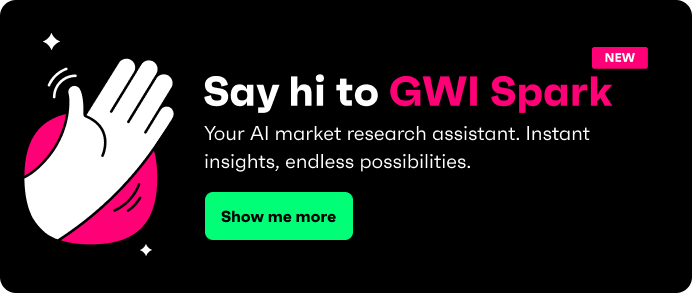Gen Z and Gen Alpha are two of the most influential generations shaping our world today. Though close in age, the cultural, tech, and societal shifts they’ve grown up with make them surprisingly different. Understanding what sets them apart (and what brings them together) can help marketers, educators, and businesses create strategies that really resonate. So, ready to bridge the generational gap? Here’s what we’re going to cover:
- Who are Gen Z and Gen Alpha
- What are the key differences between Gen Z and Gen Alpha?
- What are some similarities between Gen Z and Gen Alpha?
- What this means for marketers
- Looking ahead: The future according to Gen Alpha
1. Who are Gen Z and Gen Alpha?
Gen Z, born between 1997 and 2012, is the first generation to grow up fully immersed in the digital age. From smartphones to social media platforms like Instagram and TikTok, technology has been a huge part of their daily lives.
This constant exposure has undoubtedly shaped their worldview and their characteristics, resulting in a generation that values authenticity, independence, and social impact. They’ve also lived through some major global events, like the Great Recession and widespread climate protests, which have made them more aware of big-picture issues and driven their desire for change.
In contrast, Gen Alpha, born from 2013 onwards, is the first generation to experience AI, smart devices, and gamified digital ecosystems from birth. They interact with technology in ways previous generations could never have imagined, such as using voice assistants like Alexa, engaging with augmented reality games, and learning through AI-driven platforms.
While Gen Z adapted to technology as it developed, Gen Alpha has known no other way of life. Their upbringing and unique characteristics set them up as a generation of trailblazers, ready to weave technology into every nook and cranny of our daily lives.
2. What are the key differences between Gen Z and Gen Alpha?
Tech habits
As we’ve just covered, Gen Z experienced the rise of the internet and social platforms during their formative years. They juggle smartphones and laptops for gaming, work, and chatting - blending mobility with functionality. When it comes to gaming, they’re all about smartphones first, then PCs and consoles, reflecting their practical and versatile use of technology.
Gen Alpha, on the other hand, is the first AI-native generation. Their interaction with technology revolves around immersive and interactive experiences. Devices like tablets and gaming consoles dominate their preferences, showing their comfort with more gamified and intuitive platforms. Unlike Gen Z, Gen Alpha is less reliant on PCs or laptops, highlighting their shift toward devices that prioritize engagement and portability.
Values and priorities
For Gen Z, social causes such as mental health awareness, climate change, and inclusivity are central to their identity. They expect brands to align with these values and take tangible actions to support social justice initiatives. However, economic pressures have influenced their shopping habits, leading to a noticeable decline in their willingness to pay more for eco-friendly products. This suggests a practical mindset where values need to align with affordability.
Since 2021, the number of Gen Z who say they’d be happy to pay more for an eco-friendly product has been falling (dropped 9%).
Gen Alpha’s values are still evolving, but early trends indicate a strong emphasis on fairness, inclusivity, and collaboration. While environmental concerns remain present, their priority level appears to be waning compared to earlier generations. This might reflect the normalization of sustainability as an expectation rather than a differentiating factor.
Media preferences
Social media serves different purposes for each generation. For Gen Z, platforms like TikTok, Instagram, and Snapchat are central for self-expression, entertainment, and connecting with peers. They favor short-form, visual content that resonates emotionally and authentically.
Gen Alpha also engage with social media, but with a stronger focus on communication. Talking to friends and family online ranks as one of their top activities, highlighting a more social-first approach.
81% of 12-15 year olds say they’ve talked to their friends online in the last 7 days.
They’re less about the selfie game and more about maintaining strong relationships, which makes sense considering their formative years have been shaped by hyper-connectivity.
Education and careers
Gen Z are all about taking charge of their own education, using platforms like YouTube, Skillshare, and Coursera to learn at their own pace, on their own terms. They love flexibility and personalization, often chasing skills that match their passions and entrepreneurial dreams. Many are ditching traditional career paths, diving into side hustles and freelance gigs, and choosing meaningful work over climbing the corporate ladder.
There’s been a 34% drop in Gen Z job hunters saying opportunities for promotion matter to them since 2022.
While Gen Z are relatively self-motivated to learn, Gen Alpha prefer educational content to be increasingly gamified and AI-driven. Adaptive learning platforms and interactive apps cater to their preference for engaging and immersive experiences, while traditional education paths, like college and university, are becoming less appealing. This trend is particularly prominent in regions like the US, where interest has dropped significantly.
What are some similarities between Gen Z and Gen Alpha?
Digital-first lives
Both generations live digital-first lifestyles, relying heavily on technology for communication, entertainment, and learning. Messaging apps, video platforms, and online communities are key parts of their days, allowing them to stay connected in numerous different ways.
Authenticity
Authenticity is a shared priority for both generations. They value brands that demonstrate transparency and align with their values, expecting companies to take clear stances on social and environmental issues. Traditional advertising approaches often fall flat with these audiences, as they prefer genuine connections and meaningful narratives.
Career aspirations
Gen Z popularized the concept of side hustles and flexible work arrangements, valuing autonomy and passion over rigid career structures. This trend is mirrored in Gen Alpha’s early attitudes, with an increasing number of young people expressing interest in non-traditional career paths. Both generations are redefining success, placing greater emphasis on fulfilment and flexibility.
Podcasts
Podcasts have become a go-to for both generations, reflecting their love for convenient, on-demand content. Among Gen Z, daily podcast listenership has grown by 14% since 2021, while Gen Alpha’s engagement with podcasts has increased by an impressive 29% over the same period. Brands, here’s your golden ticket: podcasts offer an opportunity to share stories, insights, and value in a format that genuinely clicks with these audiences.
What this means for marketers
To connect with Gen Z and Gen Alpha effectively, marketers need to get savvy with their strategies. For Gen Z, platforms like TikTok and Instagram are gold mines, offering valuable opportunities to connect through short-form video content and authentic messaging. Gen Alpha need a more gamified approach, with interactive and immersive content standing out as key ways to capture their attention.
For both crowds, keeping things simple and user-friendly is a big deal. Whether it’s a product or a digital experience, these generations expect seamless, tech-forward designs that integrate effortlessly into their lifestyles. Authenticity is equally important, with both generations demanding transparency and meaningful action from brands on issues they care about. Keep it genuine, and they'll stick around.
Looking ahead: The future according to Gen Alpha
As Gen Alpha grow up, their impact on tech, education, and shopping habits will only get stronger. They’ll crave AI-powered tools that make things more personalized and convenient, from shopping to learning and everything in between. Expect gamified, immersive learning to keep shaping their education, pushing schools to keep up and innovate.
When it comes to consumerism, Gen Alpha’s expectations for hyper-connectivity will likely redefine how products and services are created and delivered, and brands that can seamlessly blend physical and digital experiences will be well-positioned to capture their loyalty. By keeping an eye on Gen Z’s path, businesses can get ahead of Gen Alpha’s needs, strengthening their strategies for long-term success.
Final thoughts
Gen Z and Gen Alpha are shaping the future in unique yet interconnected ways. To truly connect with them, you need to understand what drives them, what they value, and what they expect. With GWI’s consumer insights, you’ll have everything you need to create strategies that don’t just keep up, but stay ahead.






.webp?width=495&height=317&name=pink_thumb_graphs%20(1).webp)
.webp?width=495&height=317&name=pink_thumb_letter%20(2).webp)
